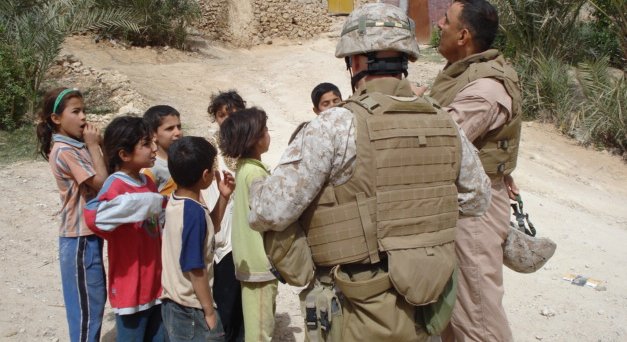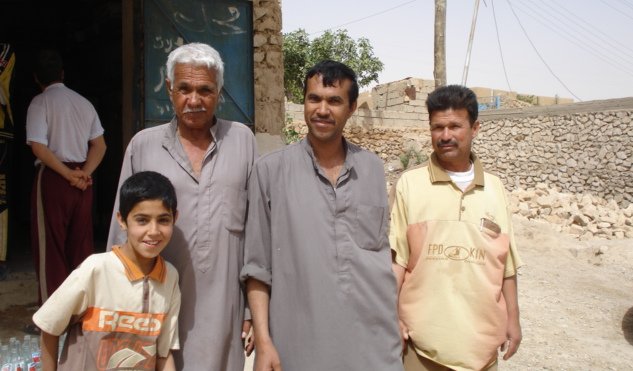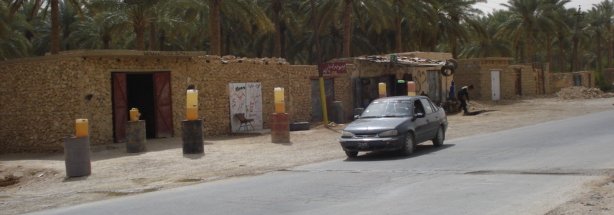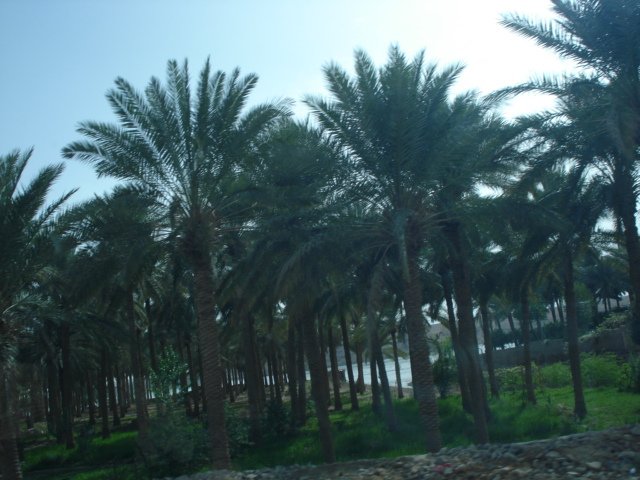
Our trip to Hadithah was cut short when we ran into a wall of dust coming in the other direction. We were lucky. A convoy of trucks coming out of Al Asad held us up. The delay meant that we were not far outside camp when word came in about the approaching dust clouds and we could go back. Being dusted down in Hadithah is less pleasant in terms of bunking and preparations (i.e. we would not have our toothbrushes etc).
So we spent the morning riding in MRAPs on a road that went nowhere, but the day was not a complete loss. Colonel Malay decided to stop off in Baghdadi, the first village outside Al Asad, and do a foot/candy patrol. Generous people back home send lots of candy and other little gifts to the Marines at Camp Ripper. They get a lot more than anybody can reasonably eat (unless their goal is to weigh 300 lbs) and they share this bounty with the local kids when they go on patrol.

I talked to the local shopkeeper in Baghdadi who told me business was bad. Costs were high and profit margins low. He didn’t have much in his shop to sell anyway. A bunch of guys gathered around to complain about the lack of jobs. They wondered if the U.S. could pressure the Iraqi government into creating some local jobs and/or if there were any good jobs to be had on Al Asad. I was a little disappointed by what they were telling me. It was not the lack of jobs, which is a legitimate problem, but the kinds of jobs they seemed to want. Everybody wanted to work for the government. The idea that private businesses could/would/should create jobs seems not to have occurred to them and did not resonate at all when I brought it up.
Of course I understand that I did not meet a representative sample and that guys hanging around on the street in the middle of the day are probably not the most active and ambitious people in town. Everybody was reasonably well dressed. The shopkeeper wore traditional Iraqi garb, but the young men were dressed in western style trousers and relatively clean shirts emblazoned with the names of Brazilian or European soccer teams. One man dressed in a t-shirt and sweatpants insisted on talking to me separately. He said that he was a trained teacher and qualified to teach math and science. Yet he had been unable to get a job teaching because successful applicants either needed to bribe or know somebody. He said that he could get a job with the IA, but preferred to work in his own field and asked that CF look into corruption in hiring at local schools.

There were many small businesses open on the street. A quick glance around revealed three “gas stations”, each consisting of several plastic tanks of gas standing in the sun. It doesn’t seem particularly safe or efficient, but it is a form of commerce. We noticed that there was significantly more gas available for sale now than in the past and the plastic tanks were sitting on 55 gallon drums of fuel. Selling gas here makes sense since we were on a main road along the Euphrates and there was consistent traffic passing by. There was also a mechanic shop and a few more shops selling groceries. Fields near the river were green and growing. They were planted with onions, lettuce, tomatoes and spring wheat and somebody had laid a few water pipes to irrigate fields a bit farther away from the riverbank. A boy herded flocks of sheep though the fields. It is clear that irrigated fields were once more extensive in the area than they are today. The Euphrates is fast flowing at this point. We saw ruins where waterwheels had once harnessed the power of the river probably to pump water to more distant places, but we didn’t see any working wheels anywhere along this stretch of the river. Water wheels may be a lost art locally. A diesel engine is less reliable and more expensive to run, but it is easier to set up and work.
Dennis has previous experience talking to local citizens about farming. Farmers complain that nobody wants to be a farmer anymore because the work is too hard. You can’t get good help these days. Everybody wants to work for the government, they complain. Our short reconnaissance and the comments of the idle young men seemed to confirm this anecdotal evidence. As usual, kids came out looking for candy. Some could ask for candy, pens or sunglasses in English. Some people came out of their houses to look at us or wave. The mood was good.

A couple of guys came up who identified themselves as administrators from the high school and elementary school. They both seemed to understand some English. We nevertheless spoke through Franco the interpreter. The two men complained that their school building had been taken over and used as a CF checkpoint. I promised that I would mention the problem to the RCT. These guys seemed intelligent and involved in their community. They said that they had fixed up buildings themselves to serve as temporary schools, but hoped that we would do the right thing and give them back their building. When I shook hands with them I noticed that – unlike those of the earlier group of young men – these guys had hard and strong hands. I don’t know what kind of work they have been doing, but it is something that requires consistent hand labor. Maybe they are indeed working to refurbish their houses to serve as schools.
They also complained about salaries and about Baghdad not giving anything to Anbar. They said that each time money moves some leaks out of the pipeline. Some leaks in Baghdad; a little more leaks in Ramadi and Hit. By the time it gets to Baghdadi there is not much left. Iraq is a rich country, they told me, but you wouldn’t know it to look around. They indicated that they had more confidence in U.S. forces than in either their local government or the national government. They were nonplussed when I suggested that there should be an Iraqi solution but asked that we intervene with the Maliki government to make changes.
